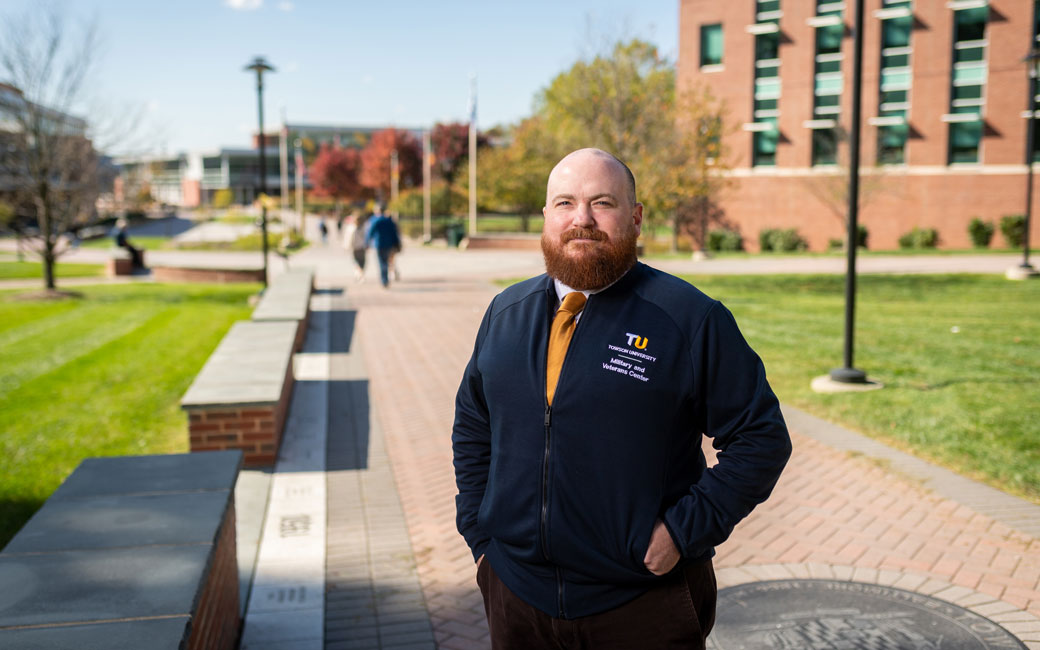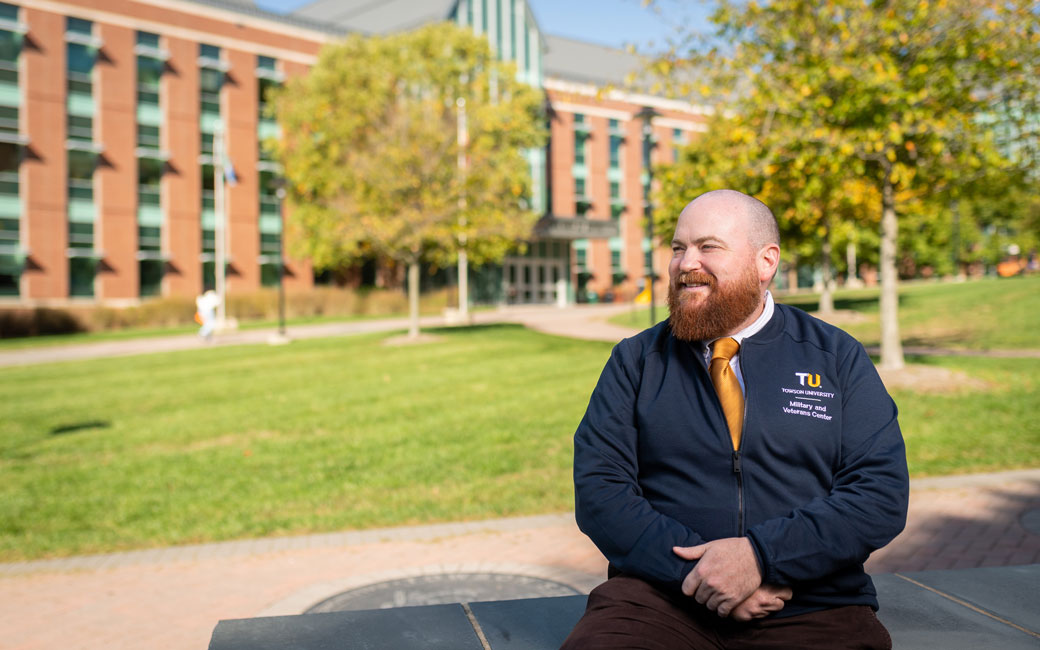A Q&A with Dario DiBattista, director of TU’s Military & Veterans Center
Learn more about how TU helps its military, veteran students adjust to college life
By Kyle Hobstetter on November 10, 2022

Fifteen years—and 40 pounds ago as he likes to joke—Dario DiBattista joined the Marine Corps. There he worked in Civil Affairs, which he describes as “the most on-the-ground version of nation-building in combat zones and other international places.”
DiBattista is a proud veteran, and he has always had a passion for higher education. When he returned from service, he studied creative writing at Johns Hopkins and has worked as an adjunct faculty member in the school’s English department. He’s also in the Doctor of Education program at Frostburg State, studying educational leadership.
He combined his passion for writing with his service by becoming a published author who has extensively covered veteran and military issues for publications like The Washington Post and The Washingtonian, as well as his own book “Retire the Colors.”
DiBattista is in his third year as the director of the Military & Veterans Center (MVC) on the first floor of the Psychology Building.
As a testament to the work done by the TU Military & Veterans Center, the university was ranked No. 7 among the best public regional universities for veterans.
What made you want to join Towson University?
After the Marines, I was a directionless and discouraged young person who didn't really have a plan. I went to school because I thought that was what one was supposed to do. And because I needed a place to live while at school and wanted to recapture the college experience I didn't get as an 18-year-old who joined the military, I became a resident assistant. I saw and experienced firsthand how transformative higher education can be and fell in love with working with students as a peer leader.
Being familiar with the Military & Veterans Center before working here, I knew exactly how those transformative experiences were already happening for so many. The transition from military to civilian life can be incredibly hard, and I like blending my experiences as a student affairs professional and veteran to inspire, impact and advocate for our military-affiliated students on that journey now.
What is the atmosphere like at the MVC?
We laugh and joke a lot. There's often a natural community that happens because of our shared experiences as veterans. It's an incredibly rewarding group of young people to work with and support. While we always try to have fun and create an enjoyable community, my colleague Toby Frevert and I—and our student peer support specialists—take our work very seriously. For all our students, the work we do is very important to their academic success. For many, our supports and services are life changing.
We're obsessed with helping military-affiliated students maximize their benefits, supporting them in crisis and emergency (like mental health challenges or financial or food insecurity), advising them on navigating the college experience and working with our university partners to improve their supports and services. We are open for business and welcome any such collaborations.
What services does the MVC offer?
Our belief that all student-veterans and their family members deserve outstanding
support and services from applicant to alumni means we’re constantly assessing, revisiting,
exploring and creating new programs and initiatives.
Beyond processing their necessary benefits earned through service, we lead professional and career development programs, maintain collaborations with the Counseling Center and the Veteran’s Affairs' VITAL Program (where a VA psychologist comes to TU weekly), hold social events, help grow and advise the Tiger Veterans Group, offer trainings for faculty and staff on how to best support our community, bring authors and other speakers to campus, award emergency grants and advocate for our students as subject matter experts.

What are some goals you have been working toward during your time with the MVC?
Our office was the first of its kind in Maryland, and there is absolutely no reason we can't be one of the top military and veterans’ programs in the U.S. Beyond my belief that is what our students deserve, TU's location, its outstanding academic programs and the fact it is commuting distance to Washington D.C.—the federal government is the No. 1 employer of veterans— provide a roadmap to growing our program and earning this status.
I want each of our community members to reach their academic potential, launching them successfully into the workforce. I want them to thrive and become the next generation of veteran leaders who will represent and advocate for their community.
It is a demographic projection that the population of veterans will shrink significantly and become more diverse within a couple decades. If we don't support each other intentionally, things might become tougher for the next generation. On some level, [the MVC} exists because of the reality that vets help vets.
How would describe TU’s military and veteran students?
The majority are ready to succeed at high levels because of their experiences in the military. Some have challenges with transitioning, are needing to explore new identities or carry with them challenges from their service. They are just like traditional students except they made a commitment to the military, which has likely changed them in some ways.
“ Our office was the first of its kind in Maryland, and there is absolutely no reason we can't be one of the top military and veterans’ programs in the U.S. ”
What advice do you give students when they first enter the MVC?
Be prepared to laugh and bring your authentic self. We will welcome you no matter
who you are.
Whether you’re at TU because you want to be, you’re unsure of who you want to be or things didn’t work out with the military so you’re trying to figure out what’s next, please enjoy the community and comradery of our office. But get into the entire university to take advantage of it.
If you’re the same person you were on day one as the person you are during Commencement, you’ve done this all wrong.
Why is it important to have this space on campus?
For some of our military-affiliated students, their challenges and needs are intersectional. Being with peers of like mind and experience then learning and growing from one another and our expert student-veteran peer support specialists can help them with transitional issues like developing an identity outside of the military order and navigating systems that might not consider their whole selves.
Some of our students would really struggle without this one-stop shop that supports the entirety of their experience as students at TU and as individuals. Moreover, having this space shows TU's commitment to the military-affiliated community. Unfortunately, many postsecondary institutions—large and small—do not offer this.
How can the TU community support the MVC and military and veteran students?
Like almost every office and department at TU, bandwidth is a real issue. We are small
yet mighty, but absolutely cannot succeed on our own. Many of our TU partners have
veteran representatives who focus at least some of their time and energy in working
for them. Many of our TU partners seek our feedback in their policies and procedures,
make special considerations in this manner and take the time to get to know our students
and understand their nontraditional backgrounds.
This is a question I get a lot and often respond with, ‘Well, what do you already do? Go ahead and focus that toward veteran identities.’ You don't have to be a veteran or even familiar with the military community to offer support to individual students. In my experiences in higher education and especially here at TU, it's good-hearted and genuine supporters with no background in the veteran space who've many times helped the most.
Again, we welcome collaborations and brainstorms, any opportunity to educate faculty and staff and are always available to represent our community in all matters of inclusivity and equity. We'd love to chat with you more. You can book an appointment—virtual or in person—or feel free to stop by.
We're very grateful for the generous support we get across the board and up and down. I absolutely believe TU to be a military-friendly school or I wouldn't be here.